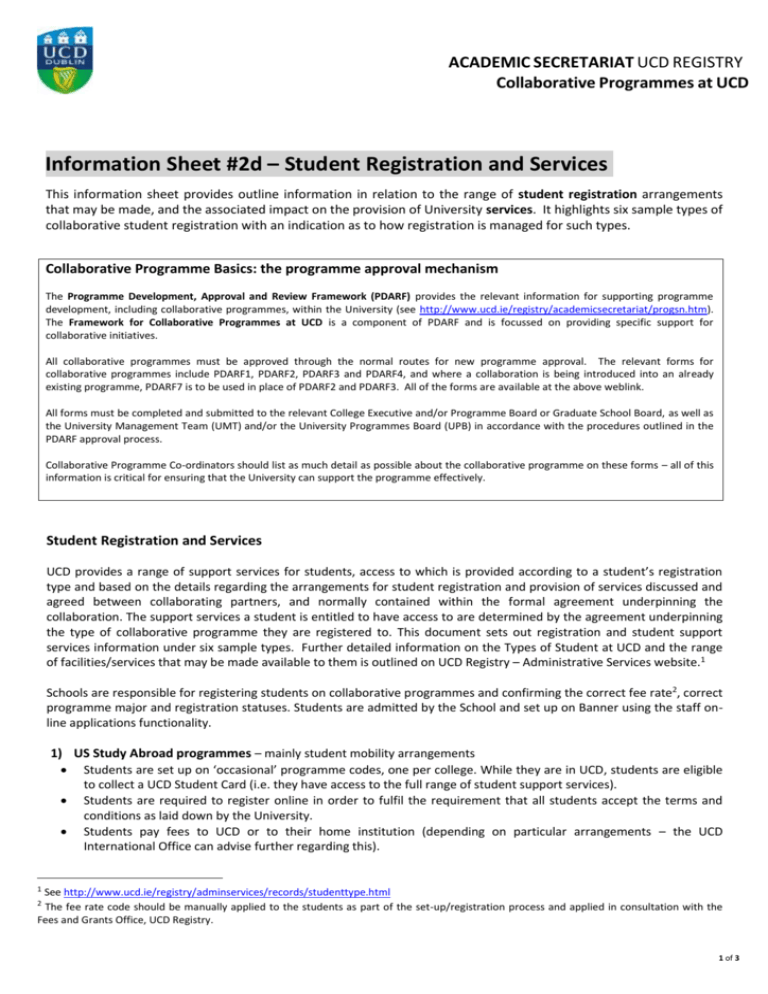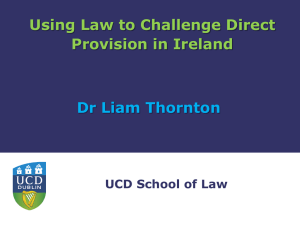Information Sheet #2d – Student Registration and Services
advertisement

ACADEMIC SECRETARIAT UCD REGISTRY Collaborative Programmes at UCD Information Sheet #2d – Student Registration and Services This information sheet provides outline information in relation to the range of student registration arrangements that may be made, and the associated impact on the provision of University services. It highlights six sample types of collaborative student registration with an indication as to how registration is managed for such types. Collaborative Programme Basics: the programme approval mechanism The Programme Development, Approval and Review Framework (PDARF) provides the relevant information for supporting programme development, including collaborative programmes, within the University (see http://www.ucd.ie/registry/academicsecretariat/progsn.htm). The Framework for Collaborative Programmes at UCD is a component of PDARF and is focussed on providing specific support for collaborative initiatives. All collaborative programmes must be approved through the normal routes for new programme approval. The relevant forms for collaborative programmes include PDARF1, PDARF2, PDARF3 and PDARF4, and where a collaboration is being introduced into an already existing programme, PDARF7 is to be used in place of PDARF2 and PDARF3. All of the forms are available at the above weblink. All forms must be completed and submitted to the relevant College Executive and/or Programme Board or Graduate School Board, as well as the University Management Team (UMT) and/or the University Programmes Board (UPB) in accordance with the procedures outlined in the PDARF approval process. Collaborative Programme Co-ordinators should list as much detail as possible about the collaborative programme on these forms – all of this information is critical for ensuring that the University can support the programme effectively. Student Registration and Services UCD provides a range of support services for students, access to which is provided according to a student’s registration type and based on the details regarding the arrangements for student registration and provision of services discussed and agreed between collaborating partners, and normally contained within the formal agreement underpinning the collaboration. The support services a student is entitled to have access to are determined by the agreement underpinning the type of collaborative programme they are registered to. This document sets out registration and student support services information under six sample types. Further detailed information on the Types of Student at UCD and the range of facilities/services that may be made available to them is outlined on UCD Registry – Administrative Services website.1 Schools are responsible for registering students on collaborative programmes and confirming the correct fee rate2, correct programme major and registration statuses. Students are admitted by the School and set up on Banner using the staff online applications functionality. 1) US Study Abroad programmes – mainly student mobility arrangements Students are set up on ‘occasional’ programme codes, one per college. While they are in UCD, students are eligible to collect a UCD Student Card (i.e. they have access to the full range of student support services). Students are required to register online in order to fulfil the requirement that all students accept the terms and conditions as laid down by the University. Students pay fees to UCD or to their home institution (depending on particular arrangements – the UCD International Office can advise further regarding this). 1 See http://www.ucd.ie/registry/adminservices/records/studenttype.html The fee rate code should be manually applied to the students as part of the set-up/registration process and applied in consultation with the Fees and Grants Office, UCD Registry. 2 1 of 3 2) EU (Erasmus) and non-EU International Exchange Students are set up on ‘occasional’ programme codes, one per college. While they are in UCD students are eligible to collect a UCD Student Card (i.e. they have access to the full range of student support services). Students are required to register online in order to fulfil the requirement that all students accept the terms and conditions as laid down by the University. Students pay fees to their home institution, not to UCD. 3) Non-EU (Erasmus Mundus) programmes Under Non-EU (Erasmus Mundus) programmes there are different fee arrangements for different students. In order to capture this information, a comment outlining the arrangement should be added to each student’s record by the School responsible for registering the student. There are two types of student; however, all students are required to register online in order to fulfil the requirement that all students accept the terms and conditions as laid down by the University. Type 1: Students are set up on ‘occasional’ programme codes, one per college. While they are in UCD students are eligible to collect a UCD Student Card (i.e. they have access to the full range of student support services). Their duration is less than that required for a UCD award; hence, this type of student does not receive a UCD award. Type 2: Students are registered to a UCD programme/major and upon successful completion receive a UCD award, e.g. the Master in Development Practice award. 4) Joint (or double degree) programmes (i.e. ‘close collaboration’) Students on joint programmes are, effectively, students of both institutions, and receive a joint (or double) degree awarded by both institutions. Students are registered to the UCD version of the programme (overall registration status of RE (where fees to UCD are required) or VE (where fees are paid to a ‘home’ institution which is not UCD)). Students are required to register online in order to fulfil the requirement that all students accept the terms and conditions as laid down by the University. Students receive a Student Card from both institutions and therefore have full access to the student support services provided by both institutions. 5) Student exchanges Student exchanges which do not fall into one of the above categories may exist on the basis of some other formal agreement. As part of the collaboration, UCD may sign Erasmus agreements with participating partner institution(s) to facilitate exchange of students.Such students may be registered by the receiving School or the International Office, as follows: Student’s home institution is not UCD but the student attends UCD to take specific modules, usually for a semester. Students are set up on ‘occasional’ programme codes, one per college. While they are in UCD students are eligible to collect a UCD Student Card (i.e. they have access to the full range of student support services). Students are required to register online in order to fulfil the requirement that all students accept the terms and conditions as laid down by the University. Students pay fees to their home institution, not to UCD. 6) UCD students taking modules in another institution as part of a formal collaborative agreement With regard to recording the modules and their grades the following applies: Recording non-UCD modules: Schools will maintain modules from other institutions in the same way as they maintain their own modules. Where a module is delivered by another institution but recorded on the Banner system, the following coding convention applies: o Subject Code – the current School subject codes will be used. o Course number – the current coding convention will be used. o Course title – the institution will be indicated in the title. 2 of 3 Example 1: CHEM40240 – Spectroscopic Techniques (TCD); Example 2: RDEV40410 – Orientation Period (Deusto) o Transfer institution – the module will be associated with the institution delivering it in the Transfer Institutions field in Banner. This can be used to exclude the module from FTE/RAM calculations. These modules should be defined in Banner as part of the programme/major structure. This can be done by the Programme Co-ordinator through the Curriculum Management System. Recording assessment: Grades will be recorded by Schools for these modules when returned by the partner institution. Such grades will only be included in the calculation of semester and stage GPA where there are agreed and published equivalences, or mechanisms to establish such equivalences, between the grades awarded by the partner institution and the UCD grading scheme, and where such scheme has been approved by the relevant University Programme Board. In such instances, a ‘Grade/Marks Table of Equivalences’ would normally be included in the relevant Memorandum of Agreement. Such modules, if managed according to these provisions, will appear on a student’s transcript with the institution clearly identified. 3 of 3








